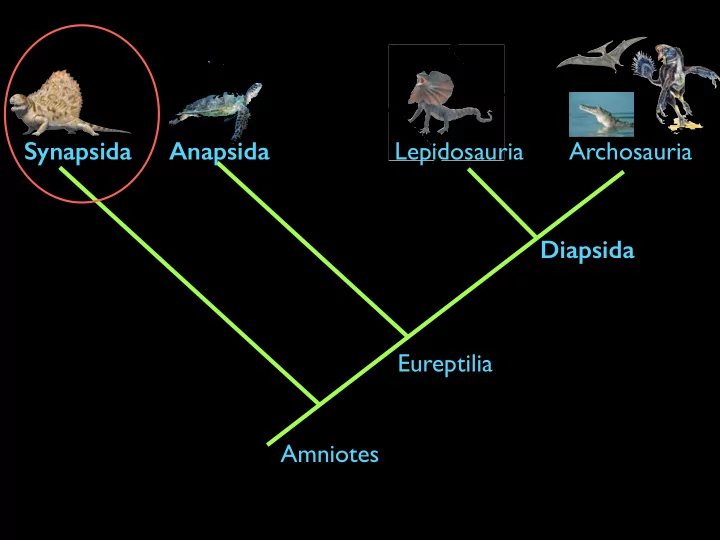

Synapsida Anapsida Lepidosauria Archosauria Diapsida Eureptilia Amniotes
(paraphyletic) Therocephalia Pelycosauria Gorgonopsia Dicynodontia Dinocephalia Cynodontia Sphenacodontids Edaphosaurids Theriodontia Therapsida Eupelycosauria Diapsida Anapsida Synapsida Amniota Eureptilia
Pelycosaurs: Early Permian Eothyris Cotylorynchus Edaphosaurus Edaphosaurids Sphenacodontids Dimetrodon
•Basal Tetraceratops •Dinocephalia • Dicynodontia •Gorgonopsids •Mammal Ancest. Moschops Arctognathus Lystrosaurus Therapsida: Mid-Late Permian Cynodontia
Synapsida Anapsida Lepidosauria Archosauria Diapsida Eureptilia Amniotes
Anapsids -Late Permian Pareiasaurs -Vegetarians Scutosaurus
Lepidosauria Archosauria Diapsida Diapsids in the Permian Weird, Wonderful, and Rare
Coelurosauravus Petrolacosaurus basal Diapsid Protorosaurus Prolacertiform Sharovipteryx Prolacertiform
The Permo-Triassic Extinction: The ‘Great Dying’
251 Ma 50% of marine families were lost across the Permo-Triassic @ 151 Ma scales to ca. 90% species loss in the sea
The ‘Death Curve’ Marine Invertebrates
What caused the extinction event? Karoo Basin, South Africa Permian Dicynodon Zone Triassic Lystrosaurus Zone
Plant Dieback => Catastraphic Erosion Evidence: • Increased erosion • Fungal explosion • Worldwide distribution Hypothesis: • Coal Gap Plant Dieback
Slow Terrestrial Floral Collapse- Greenland Pollen/Spore Cores • Fungal activity followed loss of forests and herbaceous veg • Successional weedy vegetation takes hold • Fern and cycad expansion • Most successional plants vanish, lycopsids remain • Plant abundance is drastically reduced (few pollen/spores) 500,000 to 600,000 years
If plant collapse initiated terrestrial extinctions, what caused the plant collapse???
Flavor of the Day: The Siberian Traps
Lystrosaurus : the Disaster Taxon Expansion -Few herbivorous competitors -Few carnivorous predators 95% terrestrial faunas! -@ 1 meter, the largest animal on earth There was probably nothing ‘special’ about Lystrosaurus ... It was just lucky... this is a pattern in extinction events.
Fully terrestrial animals communities Other animals obviously survived... did not recover for ca. 30 Ma Low abundance => poor fossil documentation Cynognathus early Triassic synapsid Temnospondyl amphibians Mastodonsaurus (aquatic) Proterosuchus Archosaur Dicynodonts Remained important Cynodonts Herbivores
Refugia
Pterosauria Archaic archosaurs Dinosauria Crocodiles Lepidosaurs Anapsids Synapsids Most ‘amphibians’ Archosauromorphs Most ‘fishes’ Amniotes Assorted jawless fish Tetrapoda Urochordata Gnathostomata Cephalochordata Vertebrata Chordata
The RISE of the ARCHOSAUROMORPHS!
Rhyncosauria early Triassic VERY abundant Herbivorous Pen-Knife Premaxilla/Dentary vs. ‘rostral bone’ Precision Shear
Synapsida Anapsida Archosauria Lepidosauria Archosauromorpha Diapsida Eureptilia Amniotes
Pterosauria Dinosauria Crocodylomorpha “Rauisuchia” Ornithosuchidae Ornithodira Crurotarsi Crown-clade Archosauria Basal archosaurs Archosauria
Tanystropheus Prolacertiform Basal archosaur? Maybe... or it split off before archosauria prolacertiform? Archosauria Archosauromorpha
Archosauria: synapomorphies Antorbital fenestra (in front of eye) Teeth with serrated margins Mandibular fenestra Proterosuchus Basal Archosaur
Faculatative biped vs. Obligate biped Euparkeria Derived, Basal Archosaur Bony dermal plates down back
Recommend
More recommend